- Home
- Gavin Smith
Veteran Page 2
Veteran Read online
Page 2
I was gone, immersed in the usual, the program that Vicar had written for me. Subtle, beautiful, other-worldly (though not in a way that would induce horrors) music played as one by one my senses were deprived, as I divorced from the self. I faded away. I stopped existing.
Everything that was me, the pain of wounds inflicted and received, the terror inflicted and received, all that I’d seen and done drifted away in a sense of profound dislocation. The things that I didn’t think the human mind was supposed to deal with, acts committed in the war against Them, the genocidal alien other locked in perpetual conflict with humanity, were gone. All that was left was an unfeeling abstract floating in nothing.
And just like that I was yanked back. As ever it was too short but this time something was not right. I checked my internal clock, a mere two hours. Enough was enough. I was going to find a way to kill Hamish; he was taking the piss now. I pulled the jack out from the back of my neck and slid off the bunk towards the door, but it did not slide open. I hit the manual door switch but nothing happened. I was getting concerned. This was beginning to feel like some kind of burn.
‘Hamish, you’re just making things worse for yourself,’ I said evenly. Just the slightest hint of threat in my tone, assuming that Hamish was listening.
On my internal visual display the integral communications link was flashing. Opening it up formed a small split screen in the corner of my vision. I recognised the man on the video comms link, short dark hair neatly trimmed, suave features, a degree of refinement to an underlying feeling of malice and violence. A warm smile belied by the absence of feeling in two very pale blue eyes.
I tried my best to remain passive in the face of the comms icon of a man I hated, a man who’d tried very hard to kill me.
‘Sergeant Douglas,’ the man said. He sounded genuinely pleased to see me. His tones educated and cultured, pure upper class of a vintage old enough to remember a time when breeding actually mattered.
‘Go and fuck yourself. I’m not in the army any more. You and I have nothing to say to each other.’
‘Nonsense, Jakob, mutineer or not you’re still a reservist.’ Major George Rolleston said, smiling again. ‘We have a code eleven, you’ve been reactivated.’ I barely gave this a second’s thought. A code eleven. XI. Xenomorphic Infiltration.
‘A bullshit wild goose chase. Get someone else. Turn my program back on.’
‘Don’t be like that, Jakob. I recruited you especially. After all, who more than I knows your efficiency?’
‘Even if I agreed to be reactivated—’
‘Nobody’s giving you the choice, Sergeant,’ Rolleston interrupted smoothly, breaking the unwritten rule of special forces etiquette again and using my rank.
‘Even if I decide to be reactivated,’ I reiterated through the sub-vocalised equivalent of gritted teeth. ‘I won’t work with you, you piece of shit.’ Rolleston merely smiled.
‘But Jakob, both Josephine and I are looking forward to working with you again,’ Rolleston said, and there was the threat, I thought. Josephine Bran, Rolleston’s pet killer, Royal Marine sniper, SBS with Rolleston and then seconded to Special Operations Command, someone that the other operators feared. A pale, quiet, unassuming girl, a shy girl who enjoyed and excelled at killing far too much, they called her the Grey Lady. She was the perfect servant for men such as Rolleston.
‘You turned on your own men. You tried to dump them; they served you and then you tried to space them.’
‘Perfectly legal and as per my orders,’ Rolleston said and it was true: a vagary of interstellar and colonial law had meant that there was a loophole covering the wholesale murder of a government’s own troops. A loophole that had since been removed in the outcry that followed the British government’s attempt to alleviate the social problems caused by special forces vets.
‘You tried to kill me, you bastard!’ I spat at him, losing my temper. Suddenly the smile disappeared from the Major’s face.
‘And you led a mutiny, a court-martial offence for which you and that journalist should have been executed.’ Then the smile returned to Rolleston’s cold face. ‘That reminds me. Have you heard from Howard recently?’ Suddenly I was even more suspicious. My co-conspirator in the troopship mutiny that had saved our lives and the lives of other special forces and intelligence operators had disappeared shortly after Earth fall. All attempts to find the whereabouts of Mudge had turned up nothing. The last I’d heard from him he said he was trying to find Gregor MacDonald, another disappearance that Rolleston had been involved in.
‘What do you know?’ I demanded. Because Rolleston knew all right: he’d have done something to Mudge. He’d know what happened to Gregor, he knew it all, and he knew I knew. He’d string me along on hope to get me to do what he needed. His smile disappeared.
‘Let’s stop messing around, Sergeant.’ The door to the sense booth opened. ‘You have been reactivated. You are back on full pay, and if you track the XI and bring this matter to a successful conclusion I will award you a bonus sufficient to fund your addiction for a week.’ I stepped out of the booth and looked up and down the corridor, almost expecting to see Private Josephine Bran waiting for me, but the corridor was empty.
‘I though all this XI was bullshit,’ I said. ‘I didn’t think They stood a chance against our system defences let alone Earth’s.’
‘Can you see why we would want people to think that?’ Rolleston asked somewhat patronisingly. I found the idea that They could infiltrate Earth side somewhat disturbing. I really didn’t want to find myself fighting the same war again, except this time unpaid and in the streets of Dundee. A text/picture file appeared on my internal visual display. ‘This is what we know so far. Keep me up to date. Oh, and one other thing,’ the Major said, smiling. I did not respond. ‘We’ll unlock you, but keep the locks; you’ll need them again when this is over. Collect your weapons from your strongbox.’ With this Rolleston’s face disappeared.
There was a faintly audible clicking noise from my knuckles and shoulder. Smiling I looked down and picked the locks off like they were scabs. From thin slits just behind each knuckle four razor-sharp, nine-inch ceramic blades extended slowly, and then suddenly disappeared again at my mental command.
Next I reached up and opened the Velcro-secured concealed panel on the shoulder of my armoured raincoat. On silent servos the shoulder-mounted independent laser slid out and ran through its field of fire. A small screen appearing on my visual display showed what the weapon saw, superimposing a crosshair on where it would hit if it fired.
I lit a cigarette. I’d been putting off the best until last, afraid that they were not going to give me this, let me be this free. Taking a deep breath of smoke, I held it, reaching behind me for the restraining plug wired to my central nervous system inhibiting my boosted reactions. It came away in my hand and suddenly I was alive again. The world slowed down as I sped up, feeling like a razor cutting through a slow-moving and turgid reality.
I passed Hamish’s cage; Hamish was not in it. I walked out onto the rough planks of the jury-rigged catwalks that ran through the Rigs. I finished the cigarette and flicked it into the superstructure. My shoulder laser spun up, tracking it. There was the bang of exploding superheated air as a ruby-red light momentarily illuminated the corroded orange metal of the ancient oil rig. The cigarette butt ceased to exist.
2
Dundee
I made my way through the tangle of metal and shanty town back to the stacked plastic cubes where I lived. I clambered up the stairs sending the code to open the door to the porta-cube. Entering, I looked around trying to remember where I’d left the army-issue strongbox. Finally, in a pile of dirty washing and antique, actual paper books I found the supposedly unbreakable composite super-dense plastic box. Touching the lock button it clicked open.
The two matt-black guns lay in their moulded foam surround. I picked up the Tyler Optics 5 first. I slid a battery into the handgrip, checking it manually and then running a d
iagnostic on the laser pistol. I placed the compact weapon into a moulded holster and attaching the holster just behind my right hip. I clipped a battery holder to my belt, and placed a flat recharging cell into a slimline compartment in the raincoat.
Next I took the Sterling .454 Mastodon revolver out of the box. The enormous, solid, old-fashioned revolver felt like a toy in my prosthetic right arm. It was this trusty large-calibre weapon which I’d rely on to put one of Them down, if one of Them had made it Earth side. I stripped the revolver down and cleaned the already-clean weapon. Then I checked the revolver’s action. Satisfied, the Mastodon became a familiar and welcome weight beneath my left arm in its shoulder holster. I clipped speed loaders with different loads to various easy-to-reach places.
I practised drawing both weapons through the conveniently placed slits in the armoured raincoat, checking the smartgun link, ensuring it was calibrated properly; the crosshairs appeared in my line of sight -in theory, where the bullet or beam would hit. First with one gun, then the other, then both, and finally with both weapons and the independently targeting shoulder-mounted laser. Eventually I was satisfied that all was as it should be.
Holstering the weapons I headed for the secure storage cube I rented to get my bike. After all, the government was going to be paying for fuel for the duration so there was no sense in walking. On my way down to the storage cube I split-screened my visual display and began to read through the information that that piece of shit Rolleston had sent me.
I rattled down the scaffolding steps past various plastic sheeting and cardboard lean-tos. Grubby, scrawny, suspicious faces, illuminated by the flickering flames of foul-smelling trash burners, glared at me. To them I looked well fed and wealthy. I ignored them as I enjoyed the buzz of having wired reactions again. I read through the Major’s report, it was like an old-style UFO sighting. It was full of ifs and speculation.
The crux of it was one of the strategic orbital platforms, part of Earth’s supposedly unbeatable ring of defences, had detected a faint echo in some rarely used spectrum. The echo was regular enough and moving towards the Earth with sufficient speed for the commander to order speculative firing on this ghost. The result of this firing may or may not have been a hit on something that may or may not have been space junk. The sensor system that had cost the taxpayer millions of euros was inconclusive. AI analysis of the ghost’s trajectory suggested that if it had been something and indeed had been shot down it might have landed on the outskirts of Dundee. Orbital imaging of the area had again proved to be inconclusive but had found what it termed a ‘disturbance’ and a ‘possible trench’.
I shot down the Kingsway, my enhanced central nervous system and reactions jacked into the control system of my Triumph Argo. No longer sure where I ended and the bike began. I wished I’d had access to my boosted nerves when I raced in the schemes. It would have saved me from a number of nasty wipeouts. I raced past row after row of identical fenced-in corporate wage-slave habitations. The guards at the gate watched me go by. I was travelling fast enough that all they would see was just a fractal line of light as I shot past.
By the time I’d finished reading what amounted to one of the vaguest briefings I’d ever been given, in a lifetime of vague briefings, I was pretty sure it was just another wild goose chase, an overzealous air force officer shooting at dust. I was overjoyed at the idea of investigating a possible trench. I checked the coordinates of said trench. It was outside the city in the National Park that made up the vast majority of Scotland and some of northern England.
Only a few people had access to the park, to the rest of us it was off limits. Those people who did have access were either key to the running of the park in some way, like my father had been, or very rich and powerful. The park was off limits supposedly for the countryside to recover from the nuclear exchange two hundred and fifty years ago and the pollution that had gone on before and after. I, on the other hand, had always thought that they wanted all the troublesome people in the cities where they could keep an eye on them.
I passed Camperdown, the maintained parkland for the mid-level salary types who lived on the Kingsway and were not quite wealthy enough for entrance to the National Park proper. In a lay-by at the side of the road I saw the salary men and women’s offspring. They were middle-class street tribes standing by alcohol-burning custom cars older than them. Wearing designer clothes, doing designer drugs and toting designer handguns. They studiously ignored me as I roared by. I wasn’t enough of a victim to get their attention.
Ahead of me was the checkpoint that would take me out into the National Park, away from the grime, closeness and proximity of the city. I’d spent the first thirteen years of my life in the park. My father, retired from the military, had worked as a hunting guide; my mother ran a business repairing fishing boats. Dad had taught me all about the country, how to survive, how to track, navigate, what the different fauna and flora were.
After a disgruntled client had killed him my mother didn’t have the money to stay in the park and we had to move to the Fintry Schemes in Dundee. She couldn’t quite scrape together enough money doing odd mechanical and electrical repair jobs to pay the rent and keep us fed. That was when I’d first gone to the pits. I was thirteen at the time. My mum had been a hand-to-hand combat instructor in the Paras and part of her family was Thai. Using the Muay Thai skills she’d taught me growing up, two hours a day every day, I was pretty good. I began putting more food on the table, paying my way competing in the clean unaugmented fights. Eventually I’d actually volunteered for the army, 5 Para Pathfinders like my dad. I thought the money I could send back would improve things for my mum but it was to no avail. She died shortly afterwards from a tainted dose of her favourite drug. Thinking back I don’t think I’ve ever known anyone who’s died a natural death.
The air was already beginning to smell better, more like air. I approached the checkpoint. Dundee was just a glow in the distance behind me. The barriers were up and police officers had already taken aim at me with their electromagnetic pulse rifles. I didn’t slow down. Instead I transmitted the priority security clearance that had been pan of the information that the Major had sent me. There was frantic activity as the barriers sank into the ground and the police moved out of the way and I raced past their wheeled APC.
I was out. I sucked in the cool night air, free of the city. The Triumph screamed down narrow roads, fields on either side, ahead of me in the distance the dark outlines of hills. It may as well have been another world. Dundee could have been a bad dream.
The ‘possible trench’ was about three miles off the Coupar Angus road, across a ploughed field. I put the Triumph into stealth mode, quietening the engine as much as possible. Using dirt and farm tracks, I approached as close as I could get to the coordinates I’d been given. Eventually I had to park up. I secured the bike and stood for a while acclimatising myself to the noise of the countryside before I set off on foot. I considered drawing one of my pistols but decided it would be a little melodramatic. The stillness of the night was calming.
I moved carefully but not as stealthily as I was capable. I enhanced my hearing and sight, regularly sweeping the area with thermographics. The rest of the time my cybernetic eyes were on low light, amplifying the ambient light of the moon and stars. Occasionally I would just stop and wait, let the nightlife become used to me before moving off again.
The coordinates of the possible trench were just off the summit of a low hill. As I approached the hill I stopped and had a look around. My father had taught me to track and 5 Para had improved on what I’d been taught. Even at night I could see the tracks of what looked to be a four-wheel drive. The tracks were fresh, someone had been there not that long ago.
Thermographics showed cooling chunks of heat surrounded the top of the hill. It was about this time that I wished I’d brought a motion detector. I drew the TO 5 secure in the knowledge that there was nobody around to ridicule my possibly overcautious action. If there was anyone ar
ound, they would probably be who I needed to shoot anyway. Tactically the situation was not great as it was all open ground up to the heat signatures. Just because I couldn’t see anyone around didn’t mean there wasn’t anyone there.
They used various castes of soldier. Each one appeared, according to the scant intelligence we had ever managed to get on Them, to be genetically created for a specific purpose. Their front-line soldiers, nicknamed Berserks, were bad enough. They were capable of going toe to toe with the most cybernetically enhanced trooper and even light power-armoured troops.
The Berserks weren’t the worst. The worst were Their much rarer silent killers. The ones that I’d lost the most friends to, the ones that had been predictably nicknamed Ninjas. Though I’d always thought of them as pieces of night that killed. They were genetically created or modified bioborgs, full of internal weapons and designed for stealth. They could control their body temperature and if They were going to send an infiltrator it would make sense to send a Ninja or an iteration thereof. It was fear of these things that kept me standing stock still in a field just outside Dundee.
‘Oh, this is bullshit,’ I muttered to myself. Keeping low, I held my laser pistol in a two-handed grip, the weapon extended in front of me as I headed up the hill.
I confirmed that the possible trench was in fact an actual trench, a deep one. Parts of the earth glittered, reflecting moonlight where it had turned to glass. Scattered around the site were bits of some kind of dark composite material difficult to focus on. I wouldn’t have found them had it not been for how much heat they gave off - though they were rapidly cooling. The material was the contradiction of a solid liquid that I had hoped to never see on Earth.

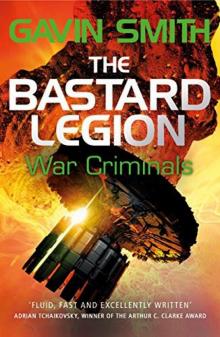 War Criminals
War Criminals Coward
Coward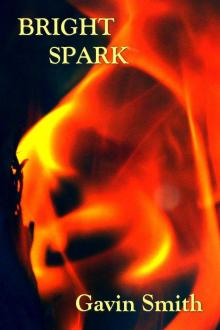 Bright Spark
Bright Spark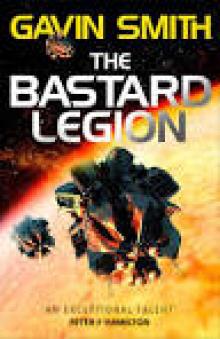 With Apologies to Joe
With Apologies to Joe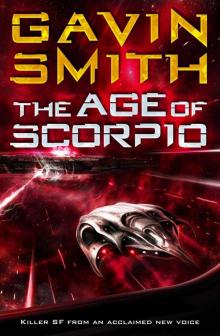 The Age of Scorpio
The Age of Scorpio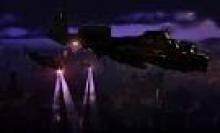 Combat jack
Combat jack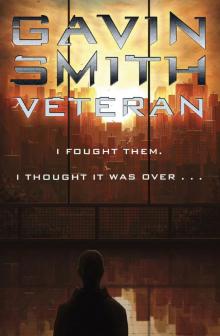 Veteran
Veteran